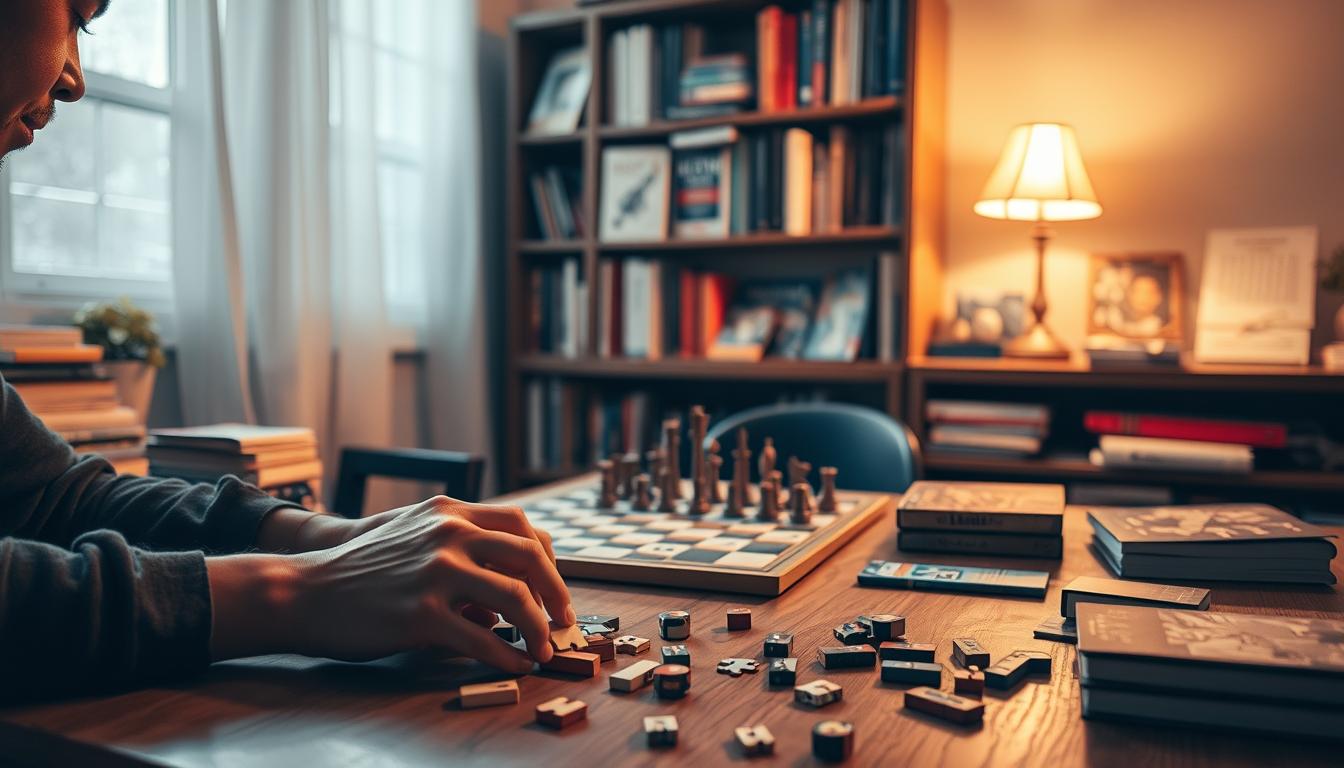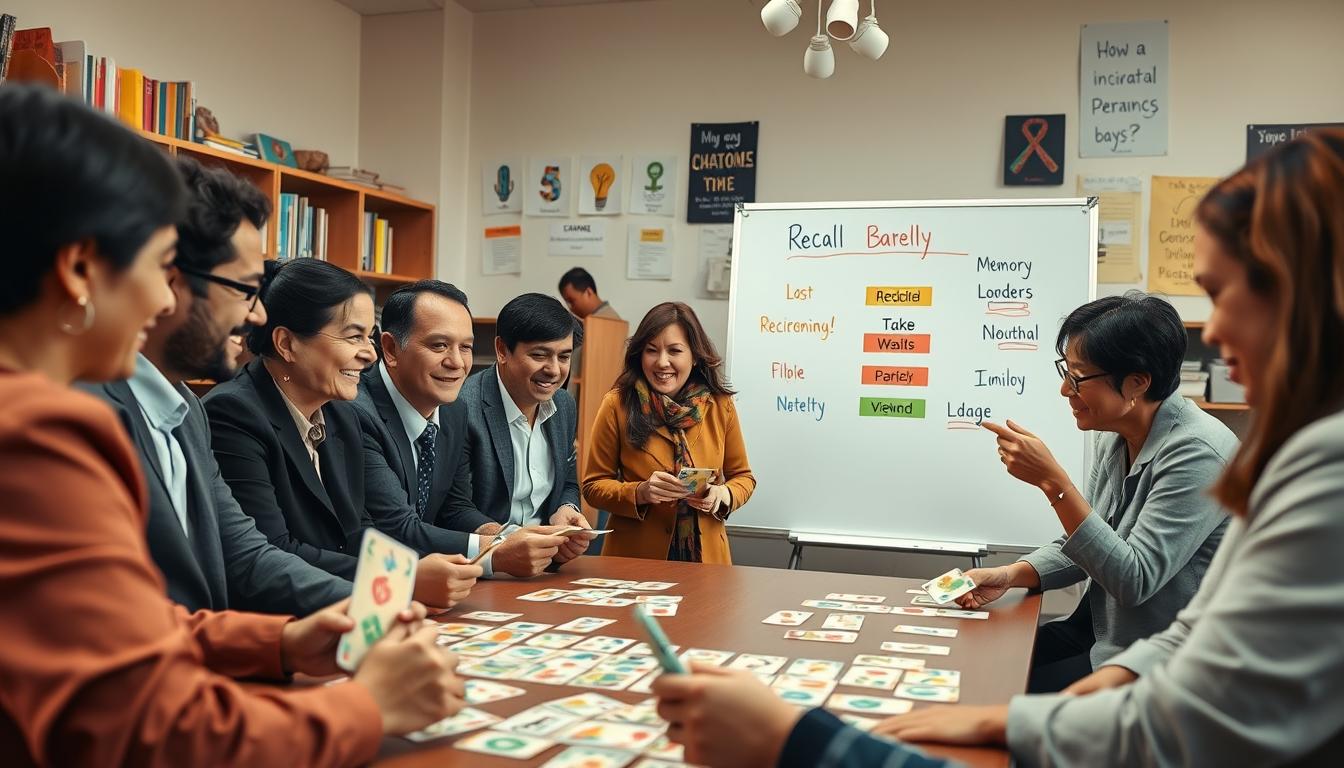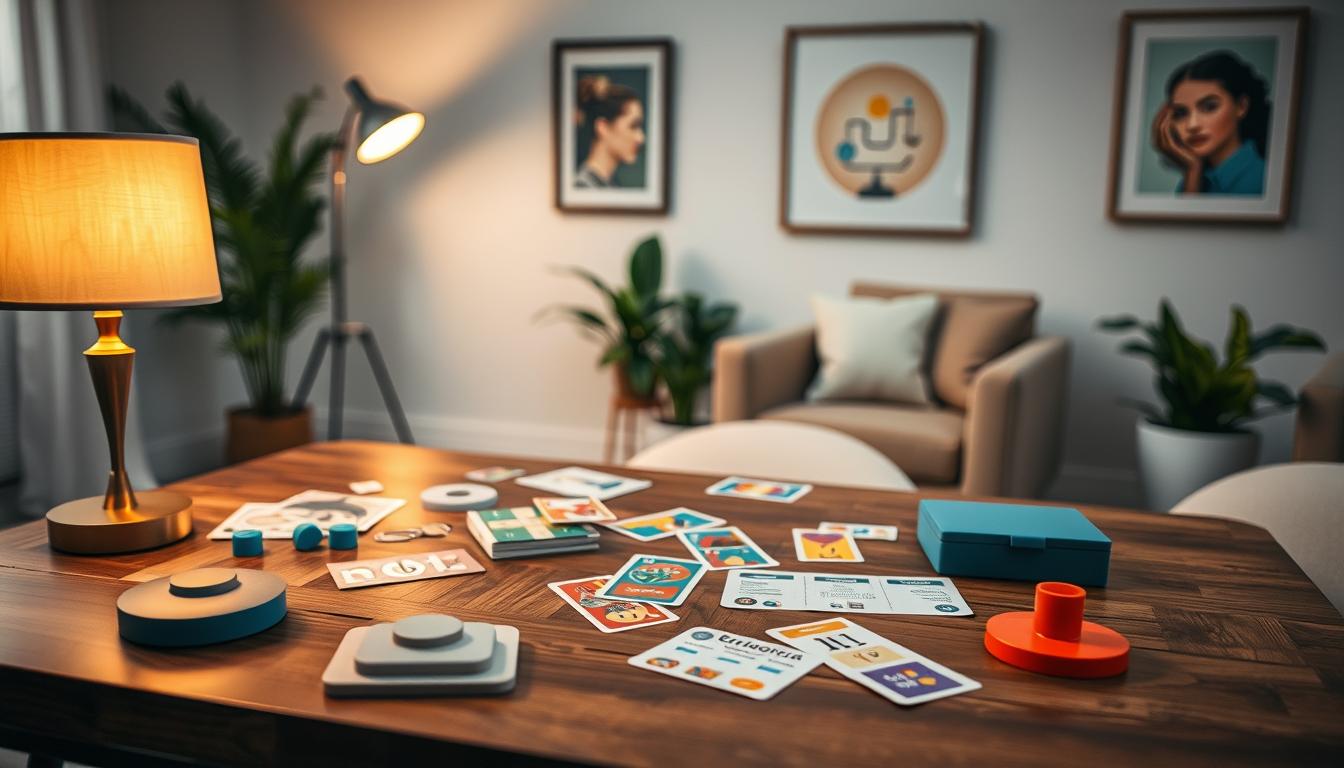Light, progressive games to reactivate cognitive skills during recovery
What if the secret to better recovery from brain issues is in fun games? Light and progressive brain games are becoming key in recovery. They offer a fun way to get back to normal, making the process enjoyable.
Introduction to Cognitive Recovery
Cognitive recovery is key after an injury or illness that hits the brain. It helps people get back their independence and live better lives. But, there are many challenges, like emotional and psychological ones, that make it hard.
These challenges show how important it is to work on both mind and spirit. Mental health recovery goes hand in hand with cognitive rehab.
Doing different cognitive activities can really help in recovery. Brain games, for example, are fun and good for the mind. They make the process easier and help improve brain function.

The Importance of Cognitive Skills in Rehabilitation
Cognitive skills are key in rehabilitation. They help people recover and get back into daily life. Skills like attention, memory, problem-solving, and decision-making are very important.
These skills help people deal with the challenges of recovery better. A strong cognitive framework makes it easier to navigate through the process.
Studies have found a strong link between cognitive health and physical rehabilitation success. People who keep their cognitive skills sharp during rehab tend to do better. For example, better attention helps follow complex instructions from therapists.
Strong memory skills also help remember important rehab exercises. This shows how crucial cognitive skills are in rehab.

It’s vital to focus on cognitive skills in rehab strategies. Activities that boost these skills lead to better adaptations. This ensures people can return to their daily routines with more confidence and ability.
What Are Brain Games for Mental Rehab in Adults?
Brain games for adults are becoming more popular. They help people recover from mental or physical health issues. These games are fun and challenge the brain in different ways.
Understanding the Concept of Brain Games
Brain games are mental rehab games that help improve thinking skills. They make learning fun and help people get better at paying attention, remembering things, and solving problems. These games are a fun way to improve your mind.
How Brain Games Enhance Cognitive Function
Playing brain games can really help your brain. Studies show they can make your brain more flexible and able to change. This is important for getting better after an illness or injury.
Using brain games as part of your recovery can make a big difference. It’s a fun way to get your brain back in shape.
Types of Light, Progressive Games
Light, progressive games are key in cognitive recovery. They come in different types, each focusing on different skills. This makes recovery fun and effective. We’ll look at board games, memory card games, and digital brain games.
Cognitive Board Games
Games like Scrabble and Settlers of Catan boost strategic thinking and problem-solving. They keep the brain active and help develop critical thinking. Plus, they encourage social interaction, making them great for mental health.
Card Games for Memory Improvement
Memory card games, like Concentration and Uno, help improve recognition and recall. They require remembering specific patterns and combinations. These games are a fun way to rebuild cognitive skills.
Digital Games and Apps
Digital brain games, such as Lumosity and Elevate, offer a wide range of cognitive exercises. They adjust to your skill level, offering new challenges as you get better. These games are not only fun but also improve memory, attention, and reasoning.
Benefits of Engaging with Brain Games
Playing brain games has many benefits that help improve our thinking. These advantages are key to better mental skills and overall health.
Promoting Neuroplasticity and Recovery
Brain games are great for promoting neuroplasticity. They help the brain make new connections. This is vital for recovering from brain injuries or impairments.
It allows people to regain lost functions and adapt to new situations.
Improving Memory and Attention Span
Brain games also boost memory. They challenge players with different tasks. This improves short-term and working memory.
It leads to clearer thinking and better focus. This practice makes us more resilient and attentive, essential for everyday tasks and learning.
Enhancing Problem-Solving Skills
Playing brain games sharpens problem-solving skills. Players learn to think critically and find creative solutions. These skills are useful in real life, helping us tackle challenges with confidence and creativity.
How to Choose the Right Games for Recovery
Choosing the right games for recovery is important. It depends on the person’s needs and how well they think. Knowing what they want to achieve helps pick the best games.
It’s key to find games that are fun but also a bit challenging. Games that are just right keep people interested and motivated. Hearing from patients helps see what games really help.
There are many types of games to choose from. You can pick from board games, card games, and digital apps. Each type can help with different skills and keep things interesting.
The main goal is to make games a part of daily life. This helps improve thinking skills and aids in recovery. By carefully choosing games, we can make a big difference in how well patients do.
| Game Type | Target Skill | Engagement Level | Effectiveness Rating |
|---|---|---|---|
| Cognitive Board Games | Strategic Thinking | High | 4.5/5 |
| Memory Card Games | Memory Recall | Medium | 4/5 |
| Digital Brain Training Apps | Multitasking | High | 4.7/5 |
| Trivia Games | Knowledge Retrieval | Medium | 3.8/5 |
Examples of Effective Brain Games
Effective brain games are great for cognitive rehabilitation. They come in many forms to suit different skills and interests. Playing these games not only sharpens the mind but also makes recovery fun.
Puzzle Games
Puzzle games are known for boosting logical thinking. Sudoku and crosswords, for example, require players to think critically. They are perfect for improving cognitive skills in a fun way.
Interactive Memory Games
Games like memory matching and Lumosity are great for memory. They make learning fun and challenging. These games help improve memory and keep the mind active.
Trivia and Knowledge-Based Games
Trivia games, like Trivial Pursuit, are fun and educational. They challenge the mind in a friendly way. These games are perfect for learning new things and having fun while doing it.
Incorporating Games into a Rehabilitation Routine
Successful rehabilitation often involves a structured approach. It emphasizes incorporating games into therapy. By embedding cognitive games into a rehabilitation routine, patients can enjoy activities that boost their cognitive abilities. A consistent cognitive activity schedule helps keep motivation high and ensures regular practice.
It’s good to set specific times for gameplay each day. This lets patients look forward to and prepare for these sessions. Mixing up game types keeps things exciting and prevents boredom. Playing games with family or therapists adds a social element, enhancing engagement and support during recovery.
Finding a balance between challenge and enjoyment is key. Patients should feel stimulated but not overwhelmed. Using game time wisely can lead to big gains in cognitive recovery. This promotes greater success in rehabilitation routines.
Gamification in Therapy
Gamification in therapy is a big step forward in making cognitive therapies better. It adds game-like elements to therapy, making it more engaging and fun. This approach helps patients get more involved and motivated in their recovery.
Benefits of Gamifying Cognitive Therapies
Gamification makes cognitive therapies more enjoyable and rewarding. It helps patients feel more excited about their recovery. The main advantages are:
- Increased Patient Motivation: Gamified experiences can lead to higher levels of engagement.
- Enhanced Enjoyment: The enjoyable aspect of games makes therapeutic activities less daunting.
- Improved Adherence: Patients are likely to stay committed to their rehabilitation programs when they find them entertaining.
Real-World Applications in Rehab Programs
Many rehabilitation programs use gamification to help patients recover better. They use technology and creative games to help patients progress. Some examples include:
- Mobile Applications: Many rehab programs offer digital platforms that provide engaging tasks and challenges.
- Interactive Workshops: Group activities incorporate game elements to strengthen social interactions and cognitive skills.
- Virtual Reality: Some programs employ VR technology to create immersive experiences targeting specific cognitive functions.
Challenges and Considerations in Game Selection
Choosing the right games for cognitive rehabilitation is tough. It’s important to know what each person needs. This includes looking at their readiness and finding games that are just right.
Assessing Patient Readiness
Figuring out if a patient is ready for brain games is key. We use cognitive assessments to see what games will help. Caregivers and therapists watch progress closely to make sure games match the person’s level.
They check often to change games as needed. This helps keep the games challenging but not too hard.
Balancing Challenge and Skill Level
It’s crucial to find games that are just the right level of difficulty. Games that are too easy don’t challenge the brain enough. But games that are too hard can make people feel frustrated.
Getting this balance right keeps patients interested and helps them grow their brain skills.
Future of Cognitive Rehabilitation Through Gaming
Technology is changing the game in cognitive rehabilitation. Virtual reality and AI-driven games are leading the way. They create interactive environments that challenge our minds.
Therapy is becoming more personalized. Games are now tailored to fit individual needs. This makes therapy more engaging and effective.
As the field grows, working together will be key. Developers, therapists, and researchers need to team up. This ensures games stay relevant and keep patients motivated. The future of cognitive rehabilitation looks bright, with new ways to help people recover.
Conclusion
Using light, progressive brain games in cognitive recovery is a big step forward. These games help improve brain functions and make recovery more fun. They create a lively space for people to get better.
These activities help the brain adapt and heal. This is key for restoring lost cognitive abilities. It’s a big part of the recovery process.
Looking at the benefits, brain games are great for memory, focus, and solving problems. Adding these fun activities to therapy makes recovery more effective and enjoyable. It helps both patients and their caregivers.
The use of brain games in therapy marks a new era in recovery. It shows a move towards more engaging and complete methods. This approach focuses on not just fixing but also improving cognitive health for a better life.
FAQ
What are light, progressive games for cognitive recovery?
Light, progressive games are fun and help people recover after injuries or illnesses. They include board games, card games, and digital apps made for rehab.
How do brain games support cognitive recovery?
Brain games help by making our brains work hard and adapt. They improve skills like attention and memory. This helps in getting better during rehab.
What types of brain games are best for cognitive rehabilitation?
Good games for rehab are strategic board games, memory card games, and interactive digital games. Each type helps with different skills and can be adjusted for each person.
Why is it important to maintain cognitive skills during rehabilitation?
Keeping skills like attention and memory sharp is key for rehab success. These skills help people get back to daily life. They’re important for reaching recovery goals.
How can I choose the right brain games for my recovery process?
Pick games that match your skills and interests. Choose ones that meet your rehab goals and are fun. This keeps you interested and playing regularly.
Can you give examples of specific brain games for recovery?
Good games include Sudoku, crosswords, memory games, and trivia. These games offer different challenges that help with rehab.
How can brain games be integrated into a rehabilitation routine?
Add games to your daily routine by setting game times. Mix up the games to keep it fun. Use games as a reward during therapy.
What is the role of gamification in cognitive therapy?
Gamification makes therapy more fun and engaging. It helps patients stick to their therapy plans. This leads to better results in rehab.
What challenges might arise when selecting brain games for rehabilitation?
Challenges include finding the right game level and keeping it fun. Make sure games don’t get too hard or stressful.
What does the future hold for cognitive rehabilitation and gaming?
The future might bring new tech like virtual reality and AI games. These could make rehab even more effective by offering personalized challenges.














